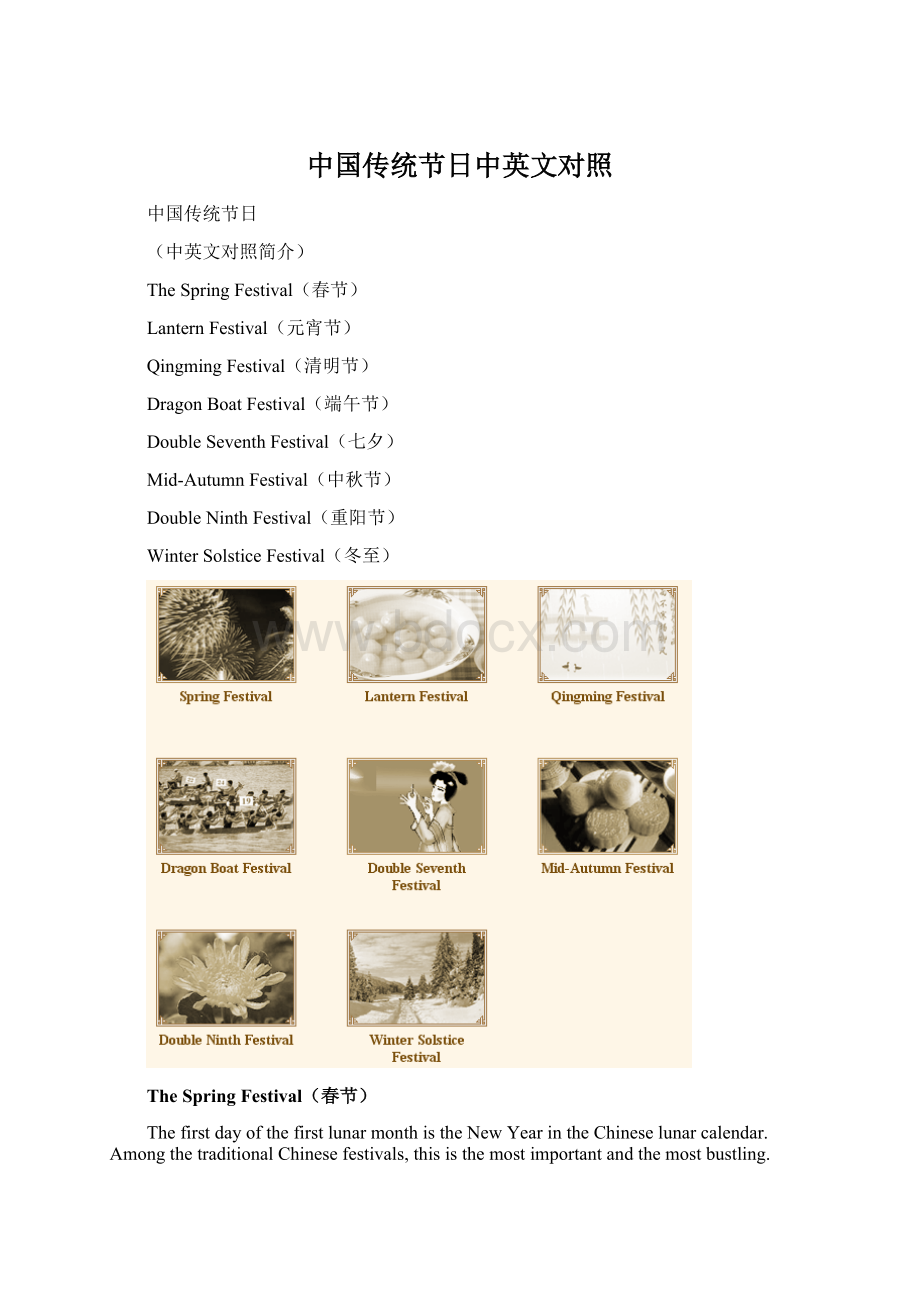中国传统节日中英文对照.docx
《中国传统节日中英文对照.docx》由会员分享,可在线阅读,更多相关《中国传统节日中英文对照.docx(13页珍藏版)》请在冰豆网上搜索。

中国传统节日中英文对照
中国传统节日
(中英文对照简介)
TheSpringFestival(春节)
LanternFestival(元宵节)
QingmingFestival(清明节)
DragonBoatFestival(端午节)
DoubleSeventhFestival(七夕)
Mid-AutumnFestival(中秋节)
DoubleNinthFestival(重阳节)
WinterSolsticeFestival(冬至)
TheSpringFestival(春节)
ThefirstdayofthefirstlunarmonthistheNewYearintheChineselunarcalendar.AmongthetraditionalChinesefestivals,thisisthemostimportantandthemostbustling.Sinceitoccursattheendofwinterandthebeginningofspring,peoplealsocallittheSpringFestival.
ChinesehavemanytraditionalcustomsrelatingtotheSpringFestival.Sincethe23rddayofthe12thlunarmontha,peoplestarttopreparefortheevent.Everyfamilywillundertakethoroughcleaning,dotheirSpringFestivalshopping,createpaper-cutsforwindowdecoration,putupNewYearpicturesb,writeSpringFestivalcoupletsc,makeNewYearcakesd,andalsoprepareallkindsoffoodtobidfarewelltotheoldandusherinthenew.
NewYear'sEveisthetimeforahappyreunionofallfamilymembers,whentheysitaroundthetabletohaveasumptuousNewYear'sEvedinner,talkingandlaughing,untildaybreak,whichiscalled"stayinguptoseetheyearout".WhenthebelltollsmidnightonNewYear'sEve,peopleeatdumplings.Inancienttimes,midnightwascalledzishi(aperiodofthedayfrom11p.m.to1a.m.).Dumplings(jiaozi)areeatenbecauseitsoundsthesameas"changeoftheyearandtheday"inChinese.
Fromthefirstdayofthelunaryear,peoplepayNewYearcallsonrelativesandfriends,whichisanimportantcustomfortheSpringFestival.
SettingofffirecrackersisthefavoriteactivityofchildrenintheSpringFestival.Accordingtolegend,thiscoulddriveoffevilspirits.Thecontinuoussoundoffirecrackerscanbeheardeverywhere,addingtotheatmosphereofrejoicingandfestivity.
Manyplacesholdtemplefairs.Thewonderfuldragonlanterndanceandtheliondanceperformances,alongwithvarioushandicraftarticlesandlocalsnacksattractthousandsofpeople.
Withthedevelopmentofthetimes,somechangeshavetakenplaceinthecustomsofspendingtheSpringFestival.Forexample,topreventenvironmentalpollution,manycitieshavebannedfirecrackers.Butthisdoesnothaveanimpactonthehappyatmosphereofthefestival.OnNewYear'sEve,familymembersgettogethertohavedinnerwhilewatchingTVprograms.
ForChineseathomeandabroad,theSpringFestivalisalwaysthemostimportantfestival.
农历的正(zheng)月初一,是中国的农历新年。
在中国的传统节日中,这是一个最重要、最热闹的节日。
因为过农历新年的时候,正是冬末春初,所以人们也把这个节日叫“春节”。
中国人过春节有很多传统习俗。
从腊月二十三起,人们就开始准备过年了。
在这段时间里,家家户户要大扫除,买年货,贴窗花,挂年画,写春联,蒸年糕,做好各种食品,准备辞旧迎新。
春节的前夜叫“除夕”。
除夕之夜,是家人团聚的时候。
一家人围坐在一起,吃一顿丰盛的年夜饭,说说笑笑,直到天亮,这叫守岁。
除夕零点的钟声一响,人们还要吃饺子。
古时候叫零点为“子时”,除夕的子时正是新旧年交替的时候,人们在这时吃饺子,是取“更岁交子”的意思。
这也是“饺子”名称的由来。
过了除夕就是大年初一。
从初一开始,人们要走亲戚、看朋友,互相拜年。
拜年,是春节的重要习俗。
拜年时,大家都要说一些祝愿幸福、健康的吉祥话。
放爆竹是春节期间孩子们最喜欢的活动。
传说燃放爆竹可以驱妖除魔,所以每年从除夕之夜起,到处就响起了接连不断的爆竹声。
阵阵烟花,声声爆竹,给节日增添了喜庆的气氛。
春节期间,很多地方还要举办庙会。
庙会上精彩的舞龙舞狮表演,各式各样的工艺品和地方小吃,吸引千千万万欢度佳节的人们。
随时代的发展,过春节的习俗也有了一些变化。
比如,为防止环境污染,很多城市已禁止燃放烟花爆竹。
但这并不影响节日的热闹气氛。
除夕之夜,家家户户仍然要团聚在一起,一边吃年夜饭,一边看精彩的电视节目,直到大年初一的清晨。
在中国和世界各地华夏子的心中,春节永远是最重要的节日。
LanternFestival(元宵节)
TheLanternFestivalfallsonthe15thdayofthe1stlunarmonth,usuallyinFebruaryorMarchintheGregoriancalendar.AsearlyastheWesternHanDynasty(206BC-AD25),ithadbecomeafestivalwithgreatsignificance.
Thisday'simportantactivityiswatchinglanterns.ThroughouttheHanDynasty(206BC-AD220),BuddhismflourishedinChina.OneemperorheardthatBuddhistmonkswouldwatchsarira,orremainsfromthecremationofBuddha'sbody,andlightlanternstoworshipBuddhaonthe15thdayofthe1stlunarmonth,soheorderedtolightlanternsintheimperialpalaceandtemplestoshowrespecttoBuddhaonthisday.Later,theBuddhistritedevelopedintoagrandfestivalamongcommonpeopleanditsinfluenceexpandedfromtheCentralPlainstothewholeofChina.
Tilltoday,thelanternfestivalisstillheldeachyeararoundthecountry.Lanternsofvariousshapesandsizesarehunginthestreets,attractingcountlessvisitors.Childrenwillholdself-madeorboughtlanternstostrollwithonthestreets,extremelyexcited.
"Guessinglanternriddles"isanessentialpartoftheFestival.Lanternownerswriteriddlesonapieceofpaperandpostthemonthelanterns.Ifvisitorshavesolutionstotheriddles,theycanpullthepaperoutandgotothelanternownerstochecktheiranswer.Iftheyareright,theywillgetalittlegift.Theactivityemergedduringpeople'senjoymentoflanternsintheSongDynasty(960-1279).Asriddleguessingisinterestingandfullofwisdom,ithasbecomepopularamongallsocialstrata.
Peoplewilleatyuanxiao,orricedumplings,onthisday,soitisalsocalledthe"YuanxiaoFestival."Yuanxiaoalsohasanothername,tangyuan.Itissmalldumplingballsmadeofglutinousriceflourwithrosepetals,sesame,beanpaste,jujubepaste,walnutmeat,driedfruit,sugarandedibleoilasfilling.Tangyuancanbeboiled,friedorsteamed.Ittastessweetanddelicious.What'smore,tangyuaninChinesehasasimilarpronunciationwith"tuanyuan”,meaningreunion.Sopeopleeatthemtodenoteunion,harmonyandhappinessforthefamily.
InthedaytimeoftheFestival,performancessuchasadragonlanterndance,aliondance,alandboatdance,ayanggedance,walkingonstiltsandbeatingdrumswhiledancingwillbestaged.Onthenight,exceptformagnificentlanterns,fireworksformabeautifulscene.MostfamiliessparesomefireworksfromtheSpringFestivalandletthemoffintheLanternFestival.Somelocalgovernmentswillevenorganizeafireworksparty.OnthenightwhenthefirstfullmoonenterstheNewYear,peoplebecomereallyintoxicatedbytheimposingfireworksandbrightmooninthesky.
每年农历的正月十五日,春节刚过,迎来的就是中国的传统节日--元宵节。
元宵主要的活动就是看灯。
东汉明帝时期,明帝提倡佛教,听说佛教有正月十五日僧人观佛舍利,点灯敬佛的做法,就命令这一天夜晚在皇宫和寺庙里点灯敬佛,令士族庶民都挂灯。
以后这种佛教礼仪节日逐渐形成民间盛大的节日。
该节经历了由宫廷到民间,由中原到全国的发展过程。
直到今天,元宵点灯的习俗仍然在中国的各地流传的,各式各样美丽的花灯在这一天都会点亮,孩子们提着自制的灯笼走街串巷,非常高兴。
猜灯谜也是元宵节的一项重要活动,花灯的主人会将谜面写在灯笼上,挂在门口,如果有人可以猜中,就能得到小小的礼物。
这项活动最早起源于宋朝,因为谜语能启迪智慧又饶有兴趣,所以流传过程中深受社会各阶层的欢迎。
民间过元宵节吃元宵的习俗。
元宵由糯米制成,或实心,或带馅。
馅有豆沙、白糖、山楂、各类果料等,食用时煮、煎、蒸、炸皆可。
起初,人们把这种食物叫“浮圆子”,后来又叫“汤团”或“汤圆”,这些名称“团圆”字音相近,取团圆之意,象征全家人团团圆圆,和睦幸福,人们也以此怀念离别的亲人,寄托了对未来生活的美好愿望。
随着时间的推移,元宵节的活动越来越多,白天有耍龙灯、耍狮子、踩高跷、划旱船扭秧歌、打太平鼓等传统民俗表演。
到了夜晚,除了五颜六色的美花灯之外,还有艳丽多姿的烟火。
大多数家庭会在春节时留下一些烟花等到元宵节这天燃放,而一些地方政府也会举办烟花大会,当新年的第一个月圆之夜在盛大的烟火表演中来临时,人们都醉在这令人难忘了烟花与皎洁的明月中。
QingmingFestival(清明节)
TheQingming(PureBrightness)Festivalisoneofthe24seasonaldivisionpointsinChina,fallingonApril4-6eachyear.Afterthefestival,thetemperaturewillriseupandrainfallincreases.Itisthehightimeforspringplowingandsowing.ButtheQingmingFestivalisnotonlyaseasonalpointtoguidefarmwork,itismoreafestivalofcommemoration.
TheQingmingFestivalseesacombinationofsadnessandhappiness.
Thisisthemostimportantdayofsacrifice.BoththeHanandminorityethnicgroupsatthistimeoffersacrificestotheirancestorsandsweepthetombsofthediseased.Also,theywillnotcookonthisdayandonlycoldfoodisserved.
TheHanshi(ColdFood)FestivalwasusuallyonedaybeforetheQingmingFestival.AsourancestorsoftenextendedthedaytotheQingming,theywerelatercombined.
OneachQingmingFestival,allcemeteriesarecrowdedwithpeoplewhocametosweeptombsandoffersacrifices.Trafficonthewaytothecemeteriesbecomesextremelyjammed.Thecustomshavebeengreatlysimplifiedtoday.Afterslightlysweepingthetombs,peopleofferfood,flowersandfavoritesofthedead,thenburnincenseandpapermoneyandbowbeforethememorialtablet.
Incontrasttothesadnessofthetombsweepers,peoplealsoenjoyhopeofSpringonthisday.TheQingmingFestivalisatimewhenthesunshinesbrightly,thetreesandgrassbecomegreenandnatureisagainlively.Sinceancienttimes,peoplehavefollowedthecustomofSpringoutings.Atthistimetouristsareeverywhere.
PeoplelovetoflykitesduringtheQingmingFestival.KiteflyingisactuallynotlimitedtotheQingmingFestival.Itsuniquenessliesinthatpeopleflykitesnotduringtheday,butalsoatnight.Astringoflittlelanternstiedontothekiteorthethreadlooklikeshiningstars,andtherefore,arecalled"god'slanterns."
TheQingmingFestivalisalsoatimetoplanttrees,forthesurvivalrateofsaplingsishighandtreesgrowfastlater.Inthepast,theQingmingFestivalwascalled"ArborDay".Butsince1979,"ArborDay"wassettledasMarch12accordingtotheGregoriancalendar.
清明是我国的二十四节气之一。
由于二十四节气比较客观地反映了一年四季气温、降雨、物候等方面的变化,所以古代劳动人民用它安排农事活动。
但是,清明作为节日,与纯粹的节气又有所不同。
节气是我国物候变化、时令顺序的标志,而节日则包含着一定的风俗活动和某种纪念意义。
因此,这个节日中既有祭扫新坟生别死离的悲酸泪,又有踏青游玩的欢笑声,是一个富有特色的节日。
清明节是我国传统节日,也是最重要的祭祀节日,是祭祖和扫墓的日子。
扫墓俗称上坟,祭祀死者的一种活动。
汉族和一些少数民族大多都是在清明节扫墓。
由于清明与寒食的日子接近,而寒食是民间禁火扫墓的日子,渐渐的,寒食与清明就合二为一了,而寒食既成为清明的别称,也变成为清明时节的一个习俗,清明之日不动烟火,只吃凉的食品。
按照旧的习俗,扫墓时,人们要携带酒食果品、纸钱等物品到墓地,将食物供祭在亲人墓前,再将纸钱焚化,为坟墓培上新土,折几枝嫩绿的新枝插在坟上,然后叩头行礼祭拜,最后吃掉酒食回家。
与清明节扫墓的悲哀相反,人们在这个春光明媚的日子里,也一样是可以享受生活的。
放风筝也是清明时节人们所喜爱的活动。
每逢清明时节,人们不仅白天放,夜间也放。
夜里在风筝下或风稳拉线上挂上一串串彩色的小灯笼,象闪烁的明星,被称为“神灯”。
清明前后,春阳照临,春阳照临,春雨飞洒,种植树苗成活率高,成长快。
因此,自古以来,我国就有清明植树的习惯。
有人还把清明节叫作“植树节”。
植树风俗一直流传至今。
1979年,人大常委会规定,每年三月十二日为我国植树节。
这对动员全国各族人民积极开展绿化祖国活动,有着十分重要的意义。
DragonBoatFestival(端午节)
TheDragonBoatFestival,the5thdayofthe5thlunarmonth,hashadahistoryofmorethan2,000years.ItisusuallyinJuneintheGregoriancalendar.
Therearemanylegendsabouttheevolutionofthefestival,themostpopularofwhichisincommemorationofQuYuan(340-278BC).QuYuanwasministeroftheStateofChuandoneofChina'searliestpoets.InfaceofgreatpressurefromthepowerfulQinState,headvocatedenrichingthecountryandstrengtheningitsmilitaryforcessoastofightag